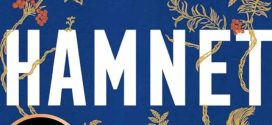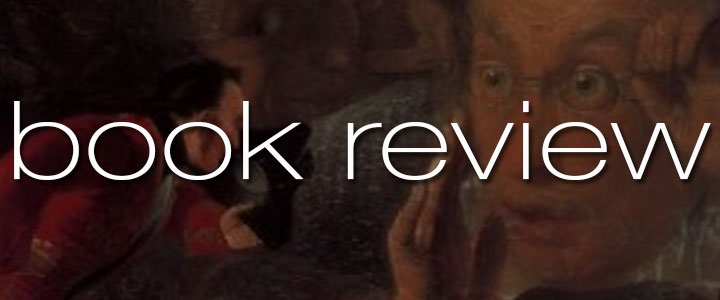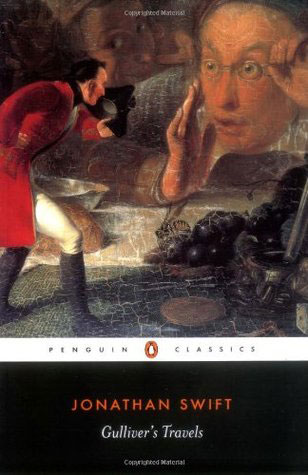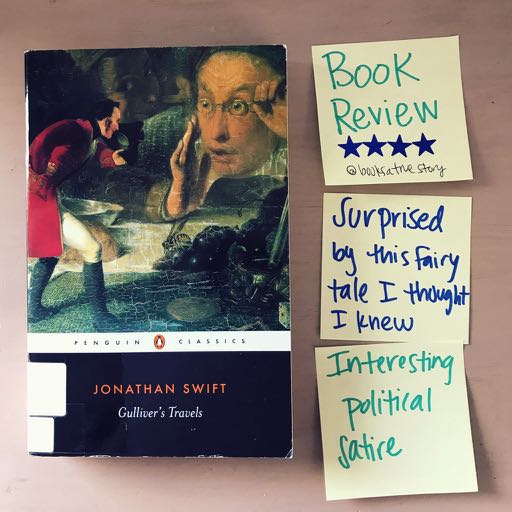- James Bond Books And Movies
- All Hindi TV Serials
- Commencement Speeches
- Privacy Policy

ThinkerViews – Views And Reviews Personal views and reviews for books, magazines, tv serials, movies, websites, technical stuff and more.
- Book Giveaway 2 | October 2024 | Hinduism: Spirituality For Leadership and Success
- Book Giveaway 1 | October 2024 | Buddha: Spirituality For Leadership and Success
Gulliver’s Travels by Jonathan Swift | Book Review
Posted by: Editor October 29, 2011 in Author , Books , Classic , English 78 Comments Updated: May 12, 2015
First published in 1726, this collection of Lemuel Gulliver’s fascinating voyages all over the world, has been loved, read and re-read by every child and adult familiar with the English language. The story appealing the children for its fictional quotient made of wonderful creatures ranging in size from a few inches to several feet, flying island, etc. and to adults for its keen representation of human nature and European society. The witty and satiric style of Jonathan Swift’s narrative has an universal appeal to every intelligent reader while the circumstances and surroundings aid in accomplishing the tale by providing the elements of fantasy and thrill.
Gulliver’s Travels – Book Cover (Published in year 1900)
| Author | Jonathan Swift | |
| Publisher | Wordsworth Classics (Dec 1999), Harpercollins (2010) and Others |
A short introduction in form of a letter by Gulliver to his readers precedes the travel chronicles, which comprises of four parts, each containing Gulliver’s experiences in a different land. Following is the synopsis of each story:
Part I: A Voyage to Lilliput (4 May 1699 — 13 April 1702)
Gulliver, a surgeon on a merchandising ship, finds himself to be the lone survivor after a shipwreck on an unknown shore where he falls asleep out of weariness. The next morning, he wakes up to find himself bound by tiny threadlike ropes and surrounded by a crowd of people, less than 6 inches high. After a while, “the Lilliputians” are convinced of his being harmless to them and slowly Gulliver gets accustomed to the people and the place. His observations of this race and their way of living, their king and his court, Gulliver’s accommodation and way of living form the next few chapters of the book. Gulliver also assists the king in a war with their enemies, the Blefuscidians, by depriving them of their entire feet but refuses to help the king in enslaving them. This and the strong dislike for him by some of the king’s ministers bring on Gulliver the dislike and penalty of the king. To escape from this, he runs away to the island of Blefuscu, from where he manages to leave the country in an abandoned boat. A passing ship rescues him and brings him back to England.
- Gulliver’s travels – English movie
- Jajantaram Mamantaram – A Bollywood movie (in Hindi and English)
Part II: A Voyage to Brobdingnag (20 June 1702 — 3 June 1706)
Gulliver ventures to a sea voyage again on a ship called Adventure which facing a storm goes off course and is forced to land at an island for fresh water. Gulliver goes on the shore and finds himself abandoned while roaming around as his fellow shipmen are driven away from the land by a monster. On the island he finds himself with the race of giants with height more than 70 feet. A farmer brings Gulliver home where his daughter nurses him. The farmer treats him as a curiosity and exhibits him for money. The Queen of Brobdingnag takes a liking to Gulliver and buys him off along with hiring his nurse as governess. Gulliver becomes a favourite of the royal family and discourses with the king at length about his native country and the rest of mankind. Though treated kindly, he keeps encountering many ridiculous accidents due to his puny size. Finally, one day, when on sea-shore, a giant eagle takes away Gulliver’s wooden house with him inside and drops him in the sea, from where he is rescued by some sailors and comes back to England.
Part III: A Voyage to Laputa, Balnibarbi, Luggnagg, Glubbdubdrib, and Japan (5 August 1706 — 16 April 1710)
This time, Gulliver’s ship is attacked by pirates who force him to leave the ship and the guy finds himself on a desolate rocky island, from where he is rescued by the inhabitants of a flying island, called Laputa. The description that Gulliver gives of the Laputians, is a strong caricature of that of musician and mathematicians, describing them as totally impractical race dwelling in the theoretical arts only. Laputa flies over a bigger island called Balnibarbi by virtue of its magnetic properties. Gulliver describes the people, the king and his kingdom, and his method of ruling from sky. He next ventures to visit the capital city of Lagado and its grand academy where all kinds of disgusting, ridiculous and fruitless research work is done.
Waiting for a ship to go to Japan, Gulliver takes a short trip to the island of Glubbdubdrib, which is inhabited by magicians. The chief of magician has power to bring back the dead and Gulliver enjoys conversations with all his favourite philosophers, politicians and other great men from history of his choice. In Luggnagg, he comes across immortals called struldburgs and for the first time starts considering the problems that immortality will bring in form of old age and infirmity. Finally, he goes to Japan, and from there to England with an intention for staying home for the rest of his life.
Part IV: A Voyage to the Country of the Houyhnhnms ( 7 September 1710 – 2 July 1715)
But the sea calls Gulliver again, and he starts his journey as a captain of a ship. During the voyage he loses some men due to illness and is forced to recruit others from different places, who finally turn the crew against him. This band of seamen is going to become pirates and hence casts away Gulliver in a landing boat. On this island, he first encounters a deformed, hideous and savage race of animals and later the masters of this land, apparently horses with advanced and reasoning intellectual capacity, who call themselves Houyhnhnms. The savage race is nothing but uncivilised and brute humans known as “yahoo” on this island.
Gulliver becomes a member of the horse’s household, and slowly becomes extremely fond of their lifestyle and way of thinking, realising all the follies and vices of humankind during his conversations with his master horse. He reloves to spend rest of his life on this island but the Assembly of the Houyhnhnms rules that Gulliver, a Yahoo with some semblance of reason, is a danger to their civilization, and expels him.
He is then rescued, against his will, by a Portuguese ship, and is surprised to see that Captain Pedro de Mendez, a Yahoo, is a wise, courteous and generous person. He returns to his home in England, but he is unable to reconcile himself to living among Yahoos and becomes a recluse, remaining in his house, largely avoiding his family and his wife, and spending several hours a day speaking with the horses in his stables.
Gulliver’s Travels is often considered to be a children’s book, mainly due to the wide publicity and popularity that the first part of the novel describing Gulliver’s adventures in Lilliput has received. But, the book in reality, is a reflective and mufti-dimensional work that addresses and represents many a traits of the human nature and human society. The chronicles are full of metaphors and the best part that links these together is the change of perspective. In every part of his voyage, Gulliver encounters a different race i.e., small, big, scientific and eccentric, wise and natural, and hence, starts viewing himself and rest of his brethren with a different point of view, identifying the evils in the human society and their root causes step-by-step. At the end of his voyages, Gulliver is a changed man, so much so that he abhors the mankind in general.
The book consists of ever-lasting wisdom and though the metaphors become crude and complex, especially in the last part, is still a worthy read. “Gulliver’s Travels” is one of those books that never lose its contemporariness …
Enjoy… 🙂
Does this review help you in making your decision to buy or read the book? Is it useful in your project? Do not forget to share this article with your friends over various social networks via Twitter , Facebook , Google Plus and others. And yes, you may like to subscribe to our RSS feeds and follow us on various Social networks to get latest updates for the site to land right in your mail box.
Tagged with: Books English Jonathan Swift Literature Reviews Views
Related Articles

The Spiderwick Chronicles Book 4 – The Ironwood Tree | Book Review
September 14, 2024

Hamnet by Maggie O’Farrell | Book Review
September 11, 2024

Colorless Tsukuru Tazaki by Haruki Murakami | Book Review
September 8, 2024
78 comments { Add Comment }
The review was helpful to me and to be able to make my project. Thnx thinkerviews 😀😀😀👨💻👨🚀https://media.giphy.com/media/vWDrezW0rMjmM/giphy.gif
We are glad that you find it helpful 🙂
Such a good book review It helped me in doing my assignment Thanx☺
Most welcome Astha, We are glad that the article prove to be helpful to you 🙂
Very nice article it would help me to understand more
We are glad Udit, that you find it helpful 🙂
And it helped me a lot in my project
Most welcome Abhinav, We are glad that you find it helpful 🙂
GULLIVER TRAVEL REVIEW IS FANTASTIC… SO THANKS ALOT
Helped me a lot . Thanks for the review
Hi Arnav, Glad to know that it helped you 🙂 You are most welcome. Feel free to share with your buddies who may need to refer it as well.
It was a helpful review for my school project. Thanks
Hi Devansh. We are glad that it is helpful to you. Most welcome.
A very nice book review it helped me for my projects thnx.
Most welcome Zahra. We are glad that the article is helpful to you.
Fantastic book review
I saw the Gulliver’s travel movie few years ago…and i like it….but i dont know that there are 4 parts of Gulliver’s travel….when i have to write a book review on any book….i search Gulliver’s travel book review…. And found your reviews…. Then i came to know that it has 4 parts…… I read the review and found it soooooo much interesting …and read the all parts…. Thx..thxx a lot….it help me so much in making my assignment and thank you so much ..because of this review… I found a very interesting book… Thank you Sir Your unknown student Rohit
this book review is soooooo long
We have also received feedback that we should have it longer than it is. Anyway, we can go ahead an have a summarized version of this one. Will it be fine? What you suggest?
I have to write a review for homework.. How should i start the 2nd paragraph before writing this???
Hey, a personal message wassent to you a few days ago, hope it helped you 🙂
I found it very useful for my summer vacation homework☺☺☺☺.
We are glad that the article is helpful to you. Let us know if there are any other books you want us to review for you.
Thank u very much…. Was really helpfull for me….. A big salute
Your most welcome Shabeer 🙂
Thank u very much…. Was really helpfull for me….. ?
Helped for project thx
Most welcome Yash 🙂
happly i am saying that…very gud information for school project…………………………………………
We are even more happy that is helpful to you 🙂
A voyoge to Lilliput is so small
Because Lilliput is the island of small people 🙂
Anyway, it depends upon the context you are asking about. Do let us know.
Hi Maheen, We are glad that the article is useful to you 🙂
The review was awesome..It helped me a lot!! Thanks !! 🙂
thanks for it helped me a lot. you people are awesome
Hey Aakash,
We are glad to know that the article is helpful to you 🙂
it helped me again
thaaaaaaaaaaaanx
Hi Aditya, We are glad that the article is helpful to you. Do let us know if you want us to review any other specific book 🙂
Books such as Sheakspear’s King Lear, Hamlet, Macbeth, R & J etc. wud be useful to a lot of ppl + it wud help u guyz gain more popularity… Anyways, cool work… really helped me a lot 😉
*Ps – It aint my real name
Hi Buddy, Glad that it is helpful to you. Suggestion noted.
this book review help me a lot
Hi Ninad, Glad that the article is helpful to you. Do let us know if you want to see reviews for any other specific book on this site 🙂
thanks for the review it is very helpful in my project and i am sure that it will help others too 🙂
Hi Advitiya,
We are glad that you like the article and found it helpful. Do let us know if you want to suggest any other book(s) for reviewing.
It was really very helpfull for me Thnx a lot for this…!!
We are glad that the article was of help to you. 🙂
great help !!! thanks 🙂
Most welcome 🙂 We are glad that the article is helpful to you.
We are happy that the article proves useful to you
this was really helpfull….thank you soo much
is a very nice blog was very much helpful
Awesome n really helpful Tnx a lot…..!!!
Most welcome Shaurya, we are glad that the article is useful to you.
thanks a lot.it was very helpful for my project…
Most welcome Ashmita, we are glad that the article is helpful to you.
Hi Gauthami, We are happy that our personal informative reviews about the book – Gulliver’s Travels are useful to you.
it really helped in my book review, thanks
it really helped in my life
its very helpful and intresting for me thnx to the author jonathan swifts and all the editors . can i have a intresting book for free?
We are glad to know that you find it helpful. Gulliver’s Travels book is available for free at Project Gutenberg. Here is the direct link to the book page, where you can select your desired version. http://www.gutenberg.org/ebooks/17157 The book is also available for free at Amazon.com as well. http://www.amazon.com/gp/product/1593081324 You may also like to read the following articles: A large list of free Ebooks – Kindle edition, available at Amazon.com Amazon India is giving away fee E-Books We publish such article periodically where we provide information about book offers where you can avail books for free. Do subscribe our RSS feeds to not to miss such articles. And yes you can share your love by linking us at various social media networks 🙂
Its really vry helpful……
We are happy that our personal views and reviews are helpful to you. -Best
It helped me a lot …thanks..!! but i just have a request if you can even post the opinion/review on each part of this book..help if you can..
Thanking you, Richa
Hi Richa, We are glad that the reviews helped you. We will try to fulfill your request to review each book separately. -Best
this is awesome. by reading this, i can able to do my assignments. many thanks to thinkerviews.
Hi Samarthya, Thank you for the comment. We are glad that our personal reviews are useful to you. Do let us know if there are other books, you want us to review. We will surely try to fulfill your wish.
Hi Atira, We are glad that you found it useful from school projects point of view. Let us know if there are any other books you are looking for similar reviews. -Editorial team
it was a very useful review for school projects. sincere thanks to the concerned. regards atira
Hi Vivek, Glad that you like it.
intresting n appreciable thanks……………….. it helped me a lot………..
Hi Chona, Glad that it helped you and you find it interesting.
its really help ful………. ican make my pjojects easily. thanks
Hi Varshita, It has been a pleasure for us that the reviews are useful to you.
It has helped me a lot. Thnx !
Hi Sanat, We are happy that it is helpful to you. 🙂
viewers and reviews is really helpfull. and i really loved this
Hi Sonam, We are glad that you found it helpful and like it.
Leave a Reply Cancel reply
Your email address will not be published. Required fields are marked *
- Humanities ›
- Literature ›
- Classic Literature ›
- Authors & Texts ›
Gulliver's Travels by Jonathan Swift
- Authors & Texts
- Top Picks Lists
- Study Guides
- Best Sellers
- Plays & Drama
- Shakespeare
- Short Stories
- Children's Books
- M.A., English Literature, California State University - Sacramento
- B.A., English, California State University - Sacramento
There are few great satirists who manage to judge their work so finely that it can be considered both a rip-roaring, fantastical adventure story suitable for children and adults alike, as well as a searing attack on the nature of society. In his Gulliver's Travels , Jonathon Swift has done precisely that and has bestowed upon us one of the great works of English literature in the process. A tale recognized far more widely than it is read, the story of Gulliver--a traveler who is, in turns, a giant, a tiny figure, a king and an idiot--is both excellent fun, as well as thoughtful, witty and wise.
The First Voyage
The travels that are referenced in Swift's title are four in number and always begin with an unfortunate incident that leaves Gulliver shipwrecked, abandoned, or otherwise lost at sea. On his first misadventure, he is washed up on the shores of Lilliput and awakes to find himself tied down by a hundred tiny threads. He soon realizes that he is a captive in a land of tiny people; compared to them, he is a giant.
The people soon put Gulliver to work--first of a manual kind, then in a war with neighboring people over the way that eggs should be properly cracked. The people turn against him when Gulliver puts out a fire in the palace by urinating on it.
Gulliver manages to return home, but he soon wishes to get out into the world again. This time, he finds himself in a land where he is tiny compared to the giants who live there. After numerous close encounters with the large animals that populate the land, and achieving some fame for his tiny size, he escapes Brobdingnag--a place he disliked because of the boorishness of its people--when a bird picks up the cage in which he resides and drops it into the sea.
On his third voyage, Gulliver pass through a number of lands, including one whose people literally have their head in the clouds. Their land floats above the normal Earth. These people are refined intellectuals who spend their time in esoteric and entirely pointless pursuits while others live below--as enslaved people.
Gulliver's final voyage takes him to a near utopia. He finds himself in a land of talking horses, called the Houyhnhnms, who rule over a world of brutish humans, called Yahoos. The society is beautiful--without violence, pettiness or greed. All the horses live together in a cohesive social unit. Gulliver feels that he is a stupid outsider. The Houyhnhnms cannot accept him because of his human form, and he escapes in a canoe. When he returns home, he is upset by the sordid nature of the human world and wishes he were back with the more enlightened horses that he left.
Beyond the Adventure
Brilliant and insightful, Gulliver's Travels , is not simply a fun adventure story. Rather, each of the worlds that Gulliver visits exhibits the features of the world in which Swift lived--often delivered in a caricatured , inflated form that is the stock in trade of a satirist.
Courtiers are given influence with a king dependent on how well they are at jumping through hoops: a sideswipe at politics. Thinkers have their head in the clouds while others suffer: a representation of intellectuals of Swift's time. And then, most tellingly, humanity's self-regard is punctured when we are portrayed as the beastly and incoherent Yahoos. Gulliver's brand of misanthropy is aimed at the lampooning and improvement of society through a form that is far removed from any kind of serious political or social tract.
Swift has a deft eye for an excellent image, and a uproarious, often bawdy sense of humor. In writing Gulliver's Travels , he has created a legend which endures up to our times and beyond.
- Biography of Ray Bradbury, American Author
- Islands in the Stream (c1951) by Ernest Hemingway
- 'A Single Man' Study Guide
- City Upon a Hill: Colonial American Literature
- Classical Writers Directory
- Biography of Chinua Achebe, Author of "Things Fall Apart"
- Biography of Saul Bellow, Canadian-American Author
- 'The Wind in the Willows' Review
- Complete List of John Steinbeck's Books
- Biography of Leo Tolstoy, Influential Russian Writer
- The Haunted House (1859) by Charles Dickens
- Biography of William Golding, British Novelist
- Biography of Charles Dickens, English Novelist
- Nothing Like the Sun (1964) by Anthony Burgess
- A Review of 'David Copperfield'
- Review of the Novel 'Around the World in 80 Days'
Books: A true story
Book reviews and some (mostly funny) true stories of my life.

Book Review: Gulliver’s Travels by Jonathan Swift
July 6, 2018 By Jessica Filed Under: Book Review 2 Comments


Gulliver's Travels
'I felt something alive moving on my left leg ... when bending my Eyes downwards as much as I could. I perceived it to be a human Creature not six inches high' Shipwrecked and cast adrift, Lemuel Gulliver wakes to find himself on Lilliput, an island inhabited by little people, whose height makes their quarrels over fashion and fame seem ridiculous. His subsequent encounters - with the crude giants of Brobdingnag, the philosophical Houyhnhnms and the brutish Yahoos - give Gulliver new, bitter insights into human behaviour. Swift's savage satire view mankind in a distorted hall of mirrors as a diminished, magnified and finally bestial species, presenting us with an uncompromising reflection of ourselves. This text, based on the first edition of 1726, reproduces all its original illustrations and includes an introduction by Robert Demaria, Jr, which discusses the ways Gulliver's Travels has been interpreted since its first publication.
Gulliver’s Travels immediately reminded me of the Princess Bride. They are both travel novels that make fun of travel novels by having the author retell someone else’s story but edit out the things they don’t like from the “original” story. For Princess Bride, it was pages and pages of packing and unpacking from the fictional novel it’s based on. For Gulliver’s Travels, it was “innumerable passages relating to the winds and tides… (pg 9-10)” although some overly technical passages were left in for kicks and giggles. Another hilarious stab at travel novels was when Gulliver says, “This is enough to say upon the subject of my diet, wherewith other travellers fill their books, as if the readers were personally concerned whether we fared will or ill. (pg 215)” I wonder how many travel novels Jonathan Swift read before he thought, “Shut up about the food!!”
Part I is about the little people and is obviously the most famous part of Gulliver’s Travels, but I didn’t realize that their trees and animals were small, too. Cute! I was surprised by the dark humor in this part, but I enjoyed it. The best example is when the little people discuss the problems of killing Gulliver and the huge carcass that they would have to deal with and the awful plague that would probably come from it.
The little people going through his things and describing them had me as confused as they were. I couldn’t figure out what some of the things were, either, because this book was so old. But their descriptions were delightful.
We saw a hollow pillar of iron, about the length of a man, fastened to a strong piece of timber larger than the pillar; and upon one side of the pillar, were huge pieces of iron sticking out, cut into strange figures, which we know not what to make of. -Jonathan Swift, Gulliver’s Travels (pg 35)
The little people took themselves way too seriously. They pick their leaders based on tight rope walking and not actual skills. This strange scene led me to Sparknotes where I learned that Gulliver’s Travels was a political satire. I just thought it was a fairy tale. It’s enjoyable as both though it’s less confusing when I knew what he was making fun of. Now I get the tight rope walking thing-it’s about politics and power. Throughout the book, some of the social commentary seemed universal and some seemed to go over my head since I didn’t know some of the context of the time period. The footnotes in this Penguin edition helped a lot.
I couldn’t believe the audacity of the little king asking Gulliver to let them poke his eyes out and calling it lenient. Gulliver says he must not be smart because it seemed the opposite of lenient to him. That’s because it’s not lenient!! Gulliver actually considers doing it because they did give him a nice noble title. I can’t imagine in what universe a noble title would be more useful than your eyes (and I’m pretty sure that’s the point.)
I was also shocked by Part II . I was familiar with the part where he becomes small in a land of giants. But they do whatever they want to him since he’s small including the women playing with him naked. Um…what?! His reaction is to be repulsed by their smell and blemishes that he can now see because of his size. This was disturbing on so many levels (luckily it’s short and not graphic.) According to Sparknotes , the microscope was new at the time and they were interested in the small details of things that actually made them gross.
The political satire became more and more blatant (even without reading Sparknotes, I knew the dispute about the eggs in Part I was referring to Catholics and Protestants) with ironic criticisms of the places he visited, like this example for the giant king in Part II:
He confined the knowledge of governing within very narrow bounds, to common sense and reason, to justic and lenity, to the speedy determination of civil and criminal causes; with some other obvious topics, which are not worth considering. -Jonathan Swift, Gulliver’s Travels (pg 126)
A more indirect criticism of English politics is when the king doesn’t want to learn about gun powder from Gulliver because he says must have been invented by Satan (which was actually an idea from Milton, according to the footnotes). The king from part II is the one who says this famous quote:
“I cannot but conclude the bulk of your natives to be the most pernicious race of little odious vermin that ever suffered to crawl upon the surface of the earth.” -Jonathan Swift, Gulliver’s Travels (pg 123)
Part III was the strangest part and the least familiar to me. The society is full of people called flappers who are always getting the attention of people by flapping them with a padded stick so they know when to talk and when to listen. The whole society seemed as zoned out as someone who is severely addicted to their smartphone. The flappers were weird, but maybe they would be useful today going around whacking people when they are on their phone too much. Just a thought.
As strange as part III is, I found it the most relevant. The whole section is a satire on technology. They have such high and unrealistic aspirations that they neglect the present. The experiments they did were absolutely crazy like extracting sunbeams from cucumbers. But according to Sparknotes , all the experiments mentioned were either proposed or actually carried out at the time this was written. After reading this section, I couldn’t help but think that we often use technology to come up with unnecessarily complicated solutions to things or that in the pursuit of advanced technology, we’ve come to neglect basic things. We value innovation at the expense of maintenance .
Allow me to geek out about one interesting fact. In Part III, Jonathan Swift made a fictional predition that Mars had 2 moons that turned out to be true. So cool!!!
Part IV probably had the best wisdom and advice. He visits a utopia populated by intelligent horses. I listened to the audiobook read by David Hyde Pierce and it was delightful, especially in part IV where he pronounces all the horse words like a horse would – neighing and all. Probably my favorite tidbit of wisdom from the horses was when Gulliver was explaining wars. He talks about the reasons and that the worst wars were caused by different opinions especially if they were about “things indifferent. (pg 226)” Sad, but true.
I found this to be another piece of good advice:
He could not understand why nature should teach us to conceal what nature had given; that neither himself nor family were ashamed of any parts of their bodies. -Jonathan Swift, Gulliver’s Travels (pg 219)
I was surprised that they believed at the time that depression only hit the lazy, luxurious, and rich. They believed hard work was the cure. I’m glad we know more about depression now and this isn’t true. However, this old fashioned perspective reminded me that the lazy and luxurious lives we as modern people does not always make you happy. I would rephrase his statement and replace “depression” with “unhappiness” and it’s a good reminder to me that hard work is more likely to make you happy than laziness.
What’s this? Is that a flash of feminism in this book written over two hundred years ago? The horses thought it “monstrous” that women were educated differently than men. It made half the population “good for nothing but bringing children into the world. (pg 247)”
At the end when Gulliver finally makes it home, instead of trying to improve society from what he learned from the horses, he despairs that the world he lives in isn’t as perfect as theirs and does nothing. He becomes almost crazy by talking to horses and becoming disconnected with his family. It’s quite a jarring ending to a fairy tale. I didn’t like it at first, but the more I thought about it the more I realized that maybe his point was that we often give up when things need to be fixed. We read satires or the news and see the many, many problems in the world and make no effort to fix any of them because we can’t fix them all. And honestly the society of horses that he thinks is so perfects sounds downright boring. No family connections, all logic, no emotions etc. Even so, I wished Gulliver had at least tried to do something. What a great insight, though. Don’t be like Gulliver – do something .
Book Review of Gulliver’s Travels on a Post-it
I post reviews like this on Instagram . Be sure to follow me there !

About Jonathan Swift

Jonathan Swift was an Anglo-Irish satirist, essayist, political pamphleteer (first for Whigs then for Tories), and poet, famous for works like Gulliver's Travels , A Modest Proposal , A Journal to Stella , The Drapier's Letters , The Battle of the Books , and A Tale of a Tub . Swift is probably the foremost prose satirist in the English language, and is less well known for his poetry. Swift published all of his works under pseudonyms — such as Lemuel Gulliver, Isaac Bickerstaff, M.B. Drapier — or anonymously. He is also known for being a master of two styles of satire; the Horatian and Juvenalian styles.
Reading this book contributed to these challenges:
- Classics Club
October 20, 2020 at 9:10 pm
I just am finishing up Gullivers Traveld. Our Classics book club will be discussing it this Saturday. I found your review and absolutely loved it! I will be sharing it with our book club and will definitely give you props!
I too loved part three the best in the book! Your techno observation of that Section was great!
Looking forward to following you on Instagram!
May 13, 2021 at 11:01 am
Well thank you! I read this book for my book club as well and we had a lot of fun talking about it. I hope your book club had fun too!
Leave a Reply Cancel reply
Your email address will not be published. Required fields are marked *

email subscription
- ADMIN AREA MY BOOKSHELF MY DASHBOARD MY PROFILE SIGN OUT SIGN IN
GULLIVER'S TRAVELS
by Jonathan Swift & adapted by James Riordan & illustrated by Victor G. Ambrus ‧ RELEASE DATE: Oct. 10, 1992
Swift's account of Gulliver's captivity in Lilliput and Brobdingnag is considerably shortened and rephrased here, but Riordan expertly preserves the flavor of the original: upon reaching the temple where he is to stay, the intrepid traveler shamefacedly relieves himself before the tiny multitudes (though the more famous scene where he similarly puts out a palace fire is absent); later, he survives plenty of harrowing adventures, admiringly describing the societies in which he's stranded while taking subtle pokes (and not-so-subtle—``Englishmen are the nastiest race of odious little vermin that Nature ever suffered to crawl upon the surface of the earth,'' says the king of Brobdingnag) at his own, and at fashion and politics in general. Large or small, Gulliver cuts a heroic figure in Ambrus's pervasive, free-wheeling illustrations; other characters have exaggerated features and a comic air that lighten the satire and serves the narrative well. Swift's ax-grinding can be indigestible in large doses; like other abridged classics from this publisher and illustrator, a palatable, well-blended appetizer. (Fiction. 12-14)
Pub Date: Oct. 10, 1992
ISBN: 0-19-279897-9
Page Count: 94
Publisher: Oxford Univ.
Review Posted Online: May 19, 2010
Kirkus Reviews Issue: Oct. 15, 1992
CHILDREN'S SCIENCE FICTION & FANTASY
Share your opinion of this book
More by Jonathan Swift

BOOK REVIEW
by Jonathan Swift & adapted by Digital Aria

by Jonathan Swift & adapted by Ann Keay Beneduce & illustrated by Gennady Spirin

THE LAST BOOK IN THE UNIVERSE
by Rodman Philbrick ‧ RELEASE DATE: Nov. 1, 2000
In this riveting futuristic novel, Spaz, a teenage boy with epilepsy, makes a dangerous journey in the company of an old man and a young boy. The old man, Ryter, one of the few people remaining who can read and write, has dedicated his life to recording stories. Ryter feels a kinship with Spaz, who unlike his contemporaries has a strong memory; because of his epilepsy, Spaz cannot use the mind probes that deliver entertainment straight to the brain and rot it in the process. Nearly everyone around him uses probes to escape their life of ruin and poverty, the result of an earthquake that devastated the world decades earlier. Only the “proovs,” genetically improved people, have grass, trees, and blue skies in their aptly named Eden, inaccessible to the “normals” in the Urb. When Spaz sets out to reach his dying younger sister, he and his companions must cross three treacherous zones ruled by powerful bosses. Moving from one peril to the next, they survive only with help from a proov woman. Enriched by Ryter’s allusions to nearly lost literature and full of intriguing, invented slang, the skillful writing paints two pictures of what the world could look like in the future—the burned-out Urb and the pristine Eden—then shows the limits and strengths of each. Philbrick, author of Freak the Mighty (1993) has again created a compelling set of characters that engage the reader with their courage and kindness in a painful world that offers hope, if no happy endings. (Fiction. 10-14)
Pub Date: Nov. 1, 2000
ISBN: 0-439-08758-9
Page Count: 224
Publisher: Blue Sky/Scholastic
Kirkus Reviews Issue: Nov. 1, 2000
CHILDREN'S ACTION & ADVENTURE FICTION | CHILDREN'S SCIENCE FICTION & FANTASY | CHILDREN'S HEALTH & DAILY LIVING
More by Rodman Philbrick

by Rodman Philbrick

THE CANDY SHOP WAR
by Brandon Mull ‧ RELEASE DATE: Sept. 12, 2007
Four fifth-graders are recruited by a scheming magician in this hefty bonbon from the author of the Fablehaven tales. At first, Nate, Summer, Trevor and Pigeon think they have it good. Having asked them to help her recover a hidden treasure that (she says) belongs to her, Belinda White, friendly proprietor of a sweets shop that has just opened in their small town, provides some uncommon candies—like Moon Rocks, that give them the ability to jump like grasshoppers, and literally electrifying Shock Bits. When she begins asking them to commit certain burglaries, though, their exhilaration turns to unease, and rightly so; Mrs. White is actually after a draft from the Fountain of Youth that will make her the world’s most powerful magician. And, as it turns out, she isn’t the only magician who’s come to town—not even the only one whose magic is tied to sweets. Filling out the supporting cast with the requisite trio of bullies, plus magical minions of various (and sometimes gross) abilities, Mull trots his twist-laden plot forward to a well set-up climax. Leaving the door open an inch for sequels, he dishes up a crowd-pleaser as delicious—if not so weird—as Charlie and the Chocolate Factory . (Fantasy. 10-13)
Pub Date: Sept. 12, 2007
ISBN: 978-1-59038-783-2
Page Count: 416
Publisher: Shadow Mountain
Kirkus Reviews Issue: Aug. 15, 2007
More by Brandon Mull

by Brandon Mull ; illustrated by Brandon Dorman

by Brandon Mull

- Discover Books Fiction Thriller & Suspense Mystery & Detective Romance Science Fiction & Fantasy Nonfiction Biography & Memoir Teens & Young Adult Children's
- News & Features Bestsellers Book Lists Profiles Perspectives Awards Seen & Heard Book to Screen Kirkus TV videos In the News
- Kirkus Prize Winners & Finalists About the Kirkus Prize Kirkus Prize Judges
- Magazine Current Issue All Issues Manage My Subscription Subscribe
- Writers’ Center Hire a Professional Book Editor Get Your Book Reviewed Advertise Your Book Launch a Pro Connect Author Page Learn About The Book Industry
- More Kirkus Diversity Collections Kirkus Pro Connect My Account/Login
- About Kirkus History Our Team Contest FAQ Press Center Info For Publishers
- Privacy Policy
- Terms & Conditions
- Reprints, Permission & Excerpting Policy
© Copyright 2024 Kirkus Media LLC. All Rights Reserved.
Popular in this Genre
Hey there, book lover.
We’re glad you found a book that interests you!
Please select an existing bookshelf
Create a new bookshelf.
We can’t wait for you to join Kirkus!
Please sign up to continue.
It’s free and takes less than 10 seconds!
Already have an account? Log in.
Trouble signing in? Retrieve credentials.
Almost there!
- Industry Professional
Welcome Back!
Sign in using your Kirkus account
Contact us: 1-800-316-9361 or email [email protected].
Don’t fret. We’ll find you.
Magazine Subscribers ( How to Find Your Reader Number )
If You’ve Purchased Author Services
Don’t have an account yet? Sign Up.

- History & Society
- Science & Tech
- Biographies
- Animals & Nature
- Geography & Travel
- Arts & Culture
- Games & Quizzes
- On This Day
- One Good Fact
- New Articles
- Lifestyles & Social Issues
- Philosophy & Religion
- Politics, Law & Government
- World History
- Health & Medicine
- Browse Biographies
- Birds, Reptiles & Other Vertebrates
- Bugs, Mollusks & Other Invertebrates
- Environment
- Fossils & Geologic Time
- Entertainment & Pop Culture
- Sports & Recreation
- Visual Arts
- Demystified
- Image Galleries
- Infographics
- Top Questions
- Britannica Kids
- Saving Earth
- Space Next 50
- Student Center
- Introduction
- Reprints and adaptations

- Why is Jonathan Swift an important writer?
- What was Jonathan Swift’s family like when he was growing up?
- What is Jonathan Swift best known for?

Gulliver’s Travels
Our editors will review what you’ve submitted and determine whether to revise the article.
- Nature - In retrospect: Gulliver's Travels
- The Guardian - The 100 best novels, No 3 – Gulliver’s Travels by Jonathan Swift (1726)
- University of Glasgow - Special Collections - Gulliver's Travels
- Literary Devices - Gulliver’s Travels
- Academia - A novel of Satire : Gulliver's Travels
- Lit2Go - Gulliver's Travels
- Pressbooks Create - An Open Companion to Early British Literature - Jonathan Swift: Gulliver’s Travels
- University of Oxford - Great Writers Inspire - Jonathan Swift
- Internet Archive - "Gulliver's travels"
- Table Of Contents
Gulliver’s Travels , four-part satirical work by Anglo-Irish author Jonathan Swift , published anonymously in 1726 as Travels into Several Remote Nations of the World . A keystone of English literature , it is one of the books that contributed to the emergence of the novel as a literary form in English. A parody of the then popular travel narrative, Gulliver’s Travels combines adventure with savage satire , mocking English customs and the politics of the day.
Gulliver’s Travels is a first-person narrative that is told from the point of view of Lemuel Gulliver, a surgeon and sea captain who visits remote regions of the world, and it describes four adventures. In the first one, Gulliver is the only survivor of a shipwreck, and he swims to Lilliput, where he is tied up by people who are less than 6 inches (15 cm) tall. He is then taken to the capital city and eventually released. The Lilliputians’ small size mirrors their small-mindedness. They indulge in ridiculous customs and petty debates. Political affiliations, for example, are divided between men who wear high-heeled shoes (symbolic of the English Tories ) and those who wear low ones (representing the English Whigs ), and court positions are filled by those who are best at rope dancing. Gulliver is asked to help defend Lilliput against the empire of Blefuscu, with which Lilliput is at war over which end of an egg should be broken, this being a matter of religious doctrine. Gulliver captures Blefuscu’s naval fleet, thus preventing an invasion, but declines to assist the emperor of Lilliput in conquering Blefuscu. Later Gulliver extinguishes a fire in the royal palace by urinating on it. Eventually he falls out of favour and is sentenced to be blinded and starved. He flees to Blefuscu, where he finds a normal-size boat and is thus able to return to England.

Gulliver’s second voyage takes him to Brobdingnag, inhabited by a race of giants. A farm worker finds Gulliver and delivers him to the farm owner. The farmer begins exhibiting Gulliver for money, and the farmer’s young daughter, Glumdalclitch, takes care of him. One day the queen orders the farmer to bring Gulliver to her, and she purchases Gulliver. He becomes a favourite at court, though the king reacts with contempt when Gulliver recounts the splendid achievements of his own civilization. The king responds to Gulliver’s description of the government and history of England by concluding that the English must be a race of “odious vermin.” Gulliver offers to make gunpowder and cannon for the king, but the king is horrified by the thought of such weaponry. Eventually Gulliver is picked up by an eagle and then rescued at sea by people of his own size.
On Gulliver’s third voyage he is set adrift by pirates and eventually ends up on the flying island of Laputa. The people of Laputa all have one eye pointing inward and the other upward, and they are so lost in thought that they must be reminded to pay attention to the world around them. Though they are greatly concerned with mathematics and with music, they have no practical applications for their learning. Laputa is the home of the king of Balnibarbri, the continent below it. Gulliver is permitted to leave the island and visit Lagado, the capital city of Balnibarbri. He finds the farm fields in ruin and the people living in apparent squalor. Gulliver’s host explains that the inhabitants follow the prescriptions of a learned academy in the city, where the scientists undertake such wholly impractical projects as extracting sunbeams from cucumbers. Later Gulliver visits Glubbdubdrib, the island of sorcerers, and there he speaks with great men of the past and learns from them the lies of history. In the kingdom of Luggnagg he meets the struldbrugs, who are immortal but age as though they were mortal and are thus miserable. From Luggnagg he is able to sail to Japan and thence back to England.

In the fourth part, Gulliver visits the land of the Houyhnhnms , a race of intelligent horses who are cleaner and more rational, communal, and benevolent (they have, most tellingly, no words for deception or evil) than the brutish, filthy, greedy, and degenerate humanoid race called Yahoos, some of whom they have tamed—an ironic twist on the human-beast relationship. The Houyhnhnms are very curious about Gulliver, who seems to be both a Yahoo and civilized, but, after Gulliver describes his country and its history to the master Houyhnhnm , the Houyhnhnm concludes that the people of England are not more reasonable than the Yahoos. At last it is decided that Gulliver must leave the Houyhnhnms. Gulliver then returns to England, so disgusted with humanity that he avoids his family and buys horses and converses with them instead.


IMAGES
VIDEO
COMMENTS
First published in 1726, this collection of Lemuel Gulliver’s fascinating voyages all over the world, has been loved, read and re-read by every child and adult familiar with the English language.
Brilliant and insightful, Gulliver's Travels, is not simply a fun adventure story. Rather, each of the worlds that Gulliver visits exhibits the features of the world in which Swift lived--often delivered in a caricatured, inflated form that is the stock in trade of a satirist.
Book Review of Gulliver's Travels by Jonathan Swift, a political satire and fairy tale novel about a man traveling to strange lands.
Enriched by Ryter’s allusions to nearly lost literature and full of intriguing, invented slang, the skillful writing paints two pictures of what the world could look like in the future—the burned-out Urb and the pristine Eden—then shows the limits and strengths of each.
Gulliver’s Travels, four-part satirical work by Anglo-Irish author Jonathan Swift, published anonymously in 1726 as Travels into Several Remote Nations of the World. A keystone of English literature, it is one of the books that contributed to the emergence of the novel as a literary form in English. A parody of the then popular travel ...
Gulliver's Travels describes the four voyages of Lemuel Gulliver, a ship's surgeon. In Lilliput he discovers a world in miniature; towering over the people and their city, he is able to view their society from the viewpoint of a god.